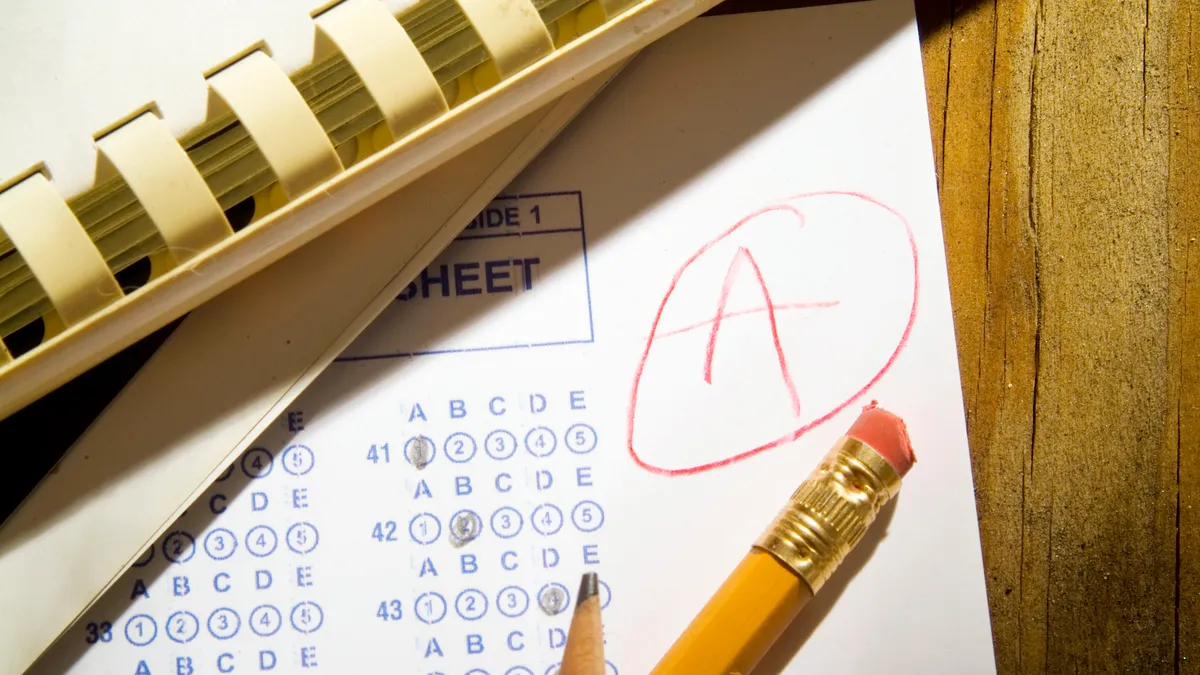Dive Brief:
- The push for more equitable grading policies has contributed to grade inflation and yielded little evidence of increased rates of learning, according to a report released Wednesday by the Thomas B. Fordham Institute, an education reform research and analysis organization.
- While some grading reforms have merit and may benefit students, practices like “no-zero” mandates, homework bans and prohibitions on penalties for late work and cheating can reduce expectations and accountability for students, the report said.
- In efforts to approach grading with more fairness and consistency, several school systems have considered or implemented reforms. The Fordham report recommends that schools, districts and states take the best of traditional and equity-oriented reforms to strengthen academic rigor and eliminate biases.
Dive Insight:
While concerns about grading inequities are legitimate, some new policies can hamper expectations for students, according to the report's co-author, Meredith Coffey, a senior research associate at Fordham.
"We argue in the brief that top-down policies that lower expectations and limit teacher discretion aren't the answer — and what's more, these policies even risk doing academic harm to the very students policymakers are trying to support," Coffey said in an email.
For example, the report points out that some new grading policies like prohibiting teachers from issuing zeros on assignments and bans on homework "confuse parents and other stakeholders who do not understand what grades have come to signify," making it harder to address learning loss.
A traditional summary grade — in addition to an explanation of clear expectations — can communicate what students know and don't know, the report said.
Coffey and co-author Adam Tyner, national research director at Fordham, classify some grading practices — including mandatory retakes, rubric-based grading, "blind grading," and grading done by someone other than a student's teacher — as ways to combat bias in grading. Other practices, like grading for participation and allowing extra credit, were described as contributing to bias.
Coffey and Tyner write that research and "common sense" show students do better academically when there are consequences to not meeting performance expectations on assignments.
"There is not an iota of hard evidence that reforms that make grading more lenient benefit students in the long run," the report said.
Other research has pointed out an increase in high school students' GPAs over time. A 2022 study from ACT, the nonprofit that administers the college admissions exam of the same name, found high school GPAs rose by 0.19 grade points on average, from 3.17 in 2010 to 3.36 in 2021.
Also in 2022, the National Assessment of Educational Progress said high school graduates earned an average 3.11 GPA in 2019, up from 3.00 in 2009 and 2.68 in 1990.
The movement to create more equitable grading systems began in the 2000s, the Fordham report said. But temporary restrictions on in-person learning due to the COVID-19 pandemic fueled more grading reform activities.
"Giving students grace" during that unprecedented time was understandable, the report said. However, as the health crisis has waned, schools should review their grading practices and identify policies that contribute to lower standards.
Specifically, the report recommends:
- Maintaining high expectations. District leaders and state education agencies should support educators' efforts to hold students to high standards, as well as be aware of grade inflation.
- Being flexible when needed. Schools and their academic departments should be allowed to weigh the costs and benefits of grading approaches and be understanding of a teachers' decision to offer a student reprieve when they truly need it. Leaders should avoid mandating reforms that could force teachers to lower standards and expectations.
- Widely adopting some equity-centered reforms. Merging effective traditional and equity-oriented approaches, such as eliminating most extra-credit assignments and implementing rigorous rubrics, can help strengthen academic courses and prevent bias.






 Dive Awards
Dive Awards






